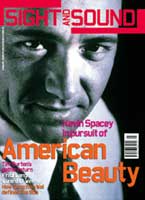Primary navigation

UK/Italy 1999
Reviewed by Philip Kemp
Our synopses give away the plot in full, including surprise twists.
The UK, the present. Teenage Charleen, who lives with her mentally-handicapped sister Jackie and her father Michael, runs away from home, planning to stay with her Uncle Bob in Edinburgh. She teams up with anti-road protester Declan. When their protest camp is raided Charleen knocks out a security guard attacking Declan. The two - plus Killer, a rescued pitbull terrier - are helped to escape by Vera, an elderly woman driving to Orkney in her van. On the road north their respective stories emerge. Charleen and her sister were sexually abused by Michael; her mother killed herself. Declan, an animal-rights activist, is estranged from his farmer father. Vera, a lesbian stricken with cancer, wants to die at the Ring of Brodgar, a neolithic circle dear to her dead lover. In Edinburgh, Charleen and Declan take leave of Vera and find Uncle Bob, who reveals to Charleen he's both her father and grandfather. That night he tries to seduce her. Charleen and Declan flee and rejoin Vera.
In the Highlands, Charleen attempts suicide in a river, but is rescued by Declan. When the party is joined by two Danish hikers, Charleen sleeps with one of them, arousing Declan's jealousy. At the ferry crossing to Orkney Declan is detained by the police. Charleen and Vera proceed to the Ring, where Vera dies peacefully. Declan, who was stopped only because Killer was unmuzzled, rejoins Charleen. They return south, where Charleen denounces Michael to the police and is reunited with Jackie.
Phil Davis' second feature as director follows hard on the heels of fellow Alan Clarke alumnus Tim Roth's directing debut The War Zone and covers similar territory. Both tackle parental sexual abuse, make meaningful use of rural settings and end with retribution meted out to the abuser. But where Roth's film starts dark and gets steadily more so, Hold Back the Night sets out to trace a journey of rehabilitation, from urban darkness and despair to the healing, wide-skied spaces of the austerely beautiful Highland landscape.
Regrettably, it's a journey that's predictable almost from the outset. No sooner has screenwriter Steve Chambers set up his main characters than we can see just where and how they're going to wind up. Each of them arrives ready-labelled with suitable dialogue. Charleen lets us know she's screwed up by swearing constantly, while Declan and his mate Irish John spout New Age babble ("Too many maggots in the psychic landscape") to signal they're tree-hugging hippies. Even the pitbull Killer can't escape this preconditioning: when Charleen attempts suicide he slips into Lassie mode and barks to alert the others. This overdetermination infects the plot. It's not enough that Charleen has been abused by her dad and almost by her grandfather. She then learns that the latter, whom she first thought was her uncle, is really her father, a revelation that by this stage borders on the risible. Further underlining comes from Peter John Vettese's songs, which tell us that, "the world is turning, ever-changing," as Charleen experiences the redemptive spaces of the Highlands, or that "we're running out of time," as Vera drives onwards. Vettese claims his music was "inspired by the trip-hop tradition," but his oddly dated idiom sounds more like late-60s folk rock.
Davis' previous film as director i.d. similarly traced a psychological journey - an undercover cop infiltrates a gang of football hooligans - and likewise suffered from overschematic plotting and characterisation. If Hold Back the Night is the more affecting film of the two, it's partly because it follows an upward instead of a downward trajectory, and partly due to Cinders Forshaw's lyrical photography, but mainly thanks to its actors. Christine Tremarco, who is in danger of typecasting, plays Charleen largely on one sullen note; but Stuart Sinclair Blyth brings a bemused sweetness to the role of Declan, and Sheila Hancock's stoic grin and pain-filled eyes movingly convey the terror behind Vera's jaunty facade. The scene of her death, propped wearily against a stone awaiting the cold dawn, lifts the film on to a whole different plane.